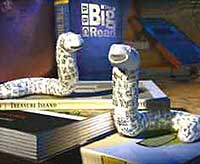| 让我从这把戏里解脱出来 |
| http://www.sina.com.cn 2004/03/11 21:39 《英语学习》 |
The Big Read<注2> is under way. Its purpose is to find thenation's Favourite Book. The BBC has decided to do for books what it did for Diana, Princess of Wales, and Winston Churchill, but this time the documentaries will follow the vote. When the Nation (and capital letters are important here) has spoken, our top 100 books will be reduced to ten, and these ten will all enjoy 60 minutes of BBC2 airtime<注3>. Never say that Auntie<注4> isn't keen on culture. At the end of it all, there will be an outright winner, and we shall probably be treated to an Austen<注5> or a Dickens<注6> love-in<注7>, or maybe a new adventure in Middle Earth<注8>. About this time I shall probably move to Paris. The British are such brutes<注9> when it comes to culture. We are so embarrassed by art that when we can't ignore it (new classical music) or make fun of it (new visual art, especially at the Tate<注10>), we try to make it like everything else ?that is, comfortable, marketable and, above all, safe. Books are a bit of a problem for the British. We know we have an astonishing literary tradition: well, Shakespeare, innit<注11>? We know that every available classic can be turned /into/ sentimental television. Thanks to the marvels of costume drama<注12>, many people sincerely believe that they have read most of 19th-century literature, and you can be sure that is /where/ the most energetic voting will take place. Virginia Woolf might do all right, now that Nicole Kidman<注13> has pointed us in the direction of Mrs Dalloway<注14>, but the fact is that we Brits<注15> love the Victorians<注16>; they make us feel cultured without /having/ to do any work. The Big Read is a typical British inanity<注17>, or do I mean insanity<注18>? People who don't read books will not start reading them because they can telephone a hotline and register their vote. People who do read might feel that narrowing a lifetime's journey /into/ one book is as stupid as it is untrue. If you love books you have a dialogue with them, and it changes as you do. A Passage to India<注19> read at 16 will not be the same book at 45. The book that changed your life in your twenties cannot do the same job in your sixties. So either you have no life or you have read no books: which is it? This is the choice the Big Read is offering. One book, folks, that's what we're looking for. What is this? Literature or an episode of Survivor<注20>? Is it about the democracy of reading or is it the Big Brother<注21> of culture? Why are we taking a world class library and submitting it to the tactics of reality television? You love Jane Eyre? Then vote her in! You hate Heathcliffe<注22>? Vote him out! Reading is an act of free will, not mass market entertainment. It is a private dialogue that cannot be monitored or controlled by the State or the media. One of the reasons why tyrants hate books is not so much for what they contain as what they symbolise. The privacy of reading protects it from the necessary control of the dictator. Democracy is our new dictator. Does everything we do have to be on television? Do we have to do it collectively? Do we have to vote on it? How about giving culture and the arts a real place on mainstream television? There is no need for this game show mentality<注23>. Tonight's extravaganza<注24> kicks off with<注25> a bunch of celebrities chatting about their favourite books for an hour and 20 minutes. This is the Posh 'n' Becks approach<注26> to culture: big names and small talk. Think how much you could read in 80 minutes. Sadly, the Big Read is not about reading, it's a frantic<注27> exercise in popularity television: fastest finger to turn the page. I don't care what the Nation decides. Collectivity is a bore. Culture is not a list. Choose a few exciting, well-read individuals and get them to make programmes about books that matter. Best of all, don't ask Clive Anderson<注28>to present any of them. 1.charade:(装模作样的)把戏。 2.theBigRead:英国广播公司(BBC)正在组织举办的一次“十本最受人喜爱的书”评选活动。 3.airtime:播放时间。 4.auntie:“大婶”,是英国人对BBC的戏称。因BBC系英国国家电视台,它的经济来源不靠广告,而是每年每户必须交付的109英镑的收视费。它既不须讨好广告商,也不必与其它频道竞争收视率,因此,BBC一向以衣冠楚楚和保守严肃的形象著称。 5.Austen:即JaneAusten (1775-1817),英国女小说家,著有PrideandPrejudice(《傲慢与偏见》),Emma(《爱玛》)等描绘英国乡村中产阶级家庭生活的作品。 6.Dickens:即CharlesDickens (1812-1870),英国小说家,著有OliverTwist(《雾都孤儿》),DavidCopperfield(《大卫·科波菲尔》)等批判现实主义的作品。 7.love-in:“爱情”聚会。 8.MiddleEarth:中土世界,在《魔戒三部曲》中有所描绘。 9.brute:粗野的人。 10.Tate:伦敦泰特现代艺术博物馆。 11.innit:init的口语形式。 12.costumedrama:古装剧。 13.NicoleKidman:澳大利亚籍女演员,因在美国电影《时时刻刻》(TheHours)中扮演英国现代女作家VirginiaWoolf获得今年奥斯卡最佳女主角奖。 14.Mrs.Dalloway:《达罗卫夫人》(1925),VirginiaWoolf的成名作。因为电影里多次出现《达罗卫夫人》的开场白,“达罗卫夫人说她要自己买花”,观众自然会对该小说予以关注。 15.Brits:即British,用于口语。 16.Victorian:指维多利亚时代(1837-1901)的作家。英国人提到Victorian,就如同中国人说“唐宋”。 17.inanity:空洞、浅薄的言行(见解)。 18.insanity:精神错乱。 19.APassagetoIndia:《印度之行》,英国作家E.M.Forster(1879-1970)的作品,创作于1924年,探讨英国与其殖民地印度之间的关系,是英国殖民地文学作品中的经典。 20.Survivor:美国哥伦比亚广播公司(CBS)推出的一个电视节目:16名参加者被放到一个荒岛上,经过激烈的生存竞争,最后胜出者可获一百万美元奖金。该节目收视率颇高。 21.BigBrother:老大哥,独裁者(语出英国作家GeorgeOrwell的讽刺小说《1984》)。 22.Heathcliffe:英国女作家EmilyBront《呼啸山庄》(WutheringHeights1847)中的人物,一个全身心致力于复仇的恶棍形象。 23.gameshowmentality: (制作)娱乐节目的思维模式。 24.extravaganza:铺张华丽的演出。 25.kickoffwith:以……开始。 26.Posh'n'Becksapproach: 时髦、做作的方式。 27.frantic:发狂的。 28.CliveAnderson:BBC的节目主持人。 阅读感评 今年4月份开始,英国广播公司(BBC)举办Big Read活动。活动分三个阶段:5月中旬前是初选,每位参加者选一部作品,作者国籍不限,但必须要有英文译本。5月17日BBC根据推举情况公布了“The Top 100”。藉此,春、夏两季,BBC都动员大家读书,并组织对最喜爱的书的讨论,同时主持人就读书问题访谈“the celebrities”;还邀请专家、学者、读者分析“The Top 100”,看看为什么有些书“魅力永存”,有些经典却悄然失色,而有些书却大胆“挤”了进来,等等。到了今年秋天,最终选定10本,据此制作十集60分钟的记录片,讲述书本身及其“当选”背后的故事。BBC说,本次活动及其伴随的系列节目的目的是:Get the whole nation reading。 这个一般人认为有文化、有品位的活动,英国大报The Times不久前却在评论版登了一篇文章,说:The Big Read is a typical British inanity, or do I mean insanity?道理主要有三: 第一,你说的“让全民读书”目的不可能兑现,因为投票人只需打个热线电话登个记就够了,根本不需要先读书;第二,让一个真正爱读书的人把一辈子的阅读经历简化为一本书,即使不是故弄玄虚也是荒唐透顶。这种评选貌似阅读的民主化,其实是走向其反面;第三,对表现形式反感,认为阅读本是私事,何必像组织“game show”那样邀请名人兴师动众呢?最后,作者总结道:Sadly, the Big Read is not about reading, it's a frantic exercise in popularity television... Collectivity is a bore. Culture is not a list. 今年年初,BBC就已经举办过一个“Top Ten”的评选活动,当然,选的不是Top Ten Books,而是Top Ten Brits。当时Winston Churchill名列榜首,王妃Dianna也高居第三。评论界对丘吉尔的地位并未提出质疑,但对戴妃的“第三”却颇有些保留。那次也是采取“全民公决”,王妃就如同大众文化,自然得到民众的喜爱;而精英群体对大众嗜好或结论总是持批判态度的,想必此次也概莫能外。这也难怪,因为大众所青睐的东西经常会使知识阶层“大跌眼镜”。不妨大胆设想一下,如果这次评选让前阶段风靡一时的Harry Potter也跻身其中,甚至“夺冠”,而William Shakespeare的作品却被挤出10名以外,甚至更惨,评论界又会怎么看呢?大概会惊呼“人心不古”了吧?但我们在承认有一种作品“have delighted people for generations”的同时,也要想到中国人所谓的“各领风骚数十年”。像莎翁这样的“不倒翁”已风光了四百年,似乎该退休了。当然,我说的是大众的阅读趣味或习惯,而非文学史的评价或编写。 作者对“celebrities chatting about their favourite books”颇为反感,说这是对文化采取的“哗众取宠”的方式,是“big names and small talks”。在这个所谓的“mass market entertainment”的时代,名人俨然成了“包治百病的灵丹妙药”或“百科全书”式的领军人物,他们常常在镜头前快速地翻阅书页,然后“我认为,我认为……”地大谈即时感想。他们似乎无所不懂、无所不能,即使是观点肤浅、言语庸俗也会被美其名曰独特、幽默。尽管如此,虽然名人不一定爱读书,而且其所读之书及读书方法也不一定值得推荐,但无可否认他们的出现确实能大大提高收视率,而且一旦他们说爱读哪本书,即使是兴之所至、信口开河,那这本书也会像得了大奖,可能一夜走红。看来,电视自有它的操作规律,让文人去办“comfortable, marketable and safe”的大众娱乐,那一定会破产倒闭的。 最后,我想谈谈,等今年秋天Top Ten书单出来后,热爱书或英国文化的中国读者有没有必要把它奉为“圣经”呢? 如果粗略地分,阅读根据目的可以一分为二:read for study; read for fun。在学习期间,多数人的多数阅读活动属于前类,这一类比较古板,有很多规定,而且还要遵嘱经常接受检查(如考试等等),就像患病后医生开药方(“药方”与“规定”在英文里是一个词:prescription)、吃药、打针、体检。抱着这种目的读书,culture真的就变成了“a list of books”,不仅书目里的书大部分保持“终身制”,而且读书方法还有极为严格的规定,不能胡来,否则就有“判官”出来指着你的鼻子说:“这不合学术规范,长此以往,你休想入门。”这类书代表的是the Big Brother of culture。大家当时对此敢怒而不敢言,但毕业时许多学生毁的大多是这种书,以泄多年淤积的愤怒与无奈。有一个英国名人就说:“It took me years to overcome the fear of 'real books' that school installed in me.”即使是有些“修成正果”的学者,回忆这段往事时也多予以批判,虽然在学术场所他们不会忘记感谢老师曾指导自己读了许多“正经书”。而人们即使带最少的行李也要塞进包里去的、值得永久怀恋的或曾影响他一生的书,往往是“the book(s) for your fun-reading”。这类书代表了“the democracy of reading”,充分体现了阅读是“an act of free will, a private dialogue (with the author or your own imagination)”,是你在最放松的时候以最放松的方式做最自由的事。我想,Top Ten不管最终以何种面目出现,里面的书应该都是属于此类。既然你的favourite(s)纯属你的自由选择,那么,你大可不必理会别人的单子,更不必去赶阅读的时髦。要知道,如果“One man誷meat is another's poison.”成立的话,那么在读书方面“Favourites in your home are junk in another, or vice versa.”,更是天经地义了。 |
| 【英语学习论坛】【评论】【大 中 小】【打印】【关闭】 |
